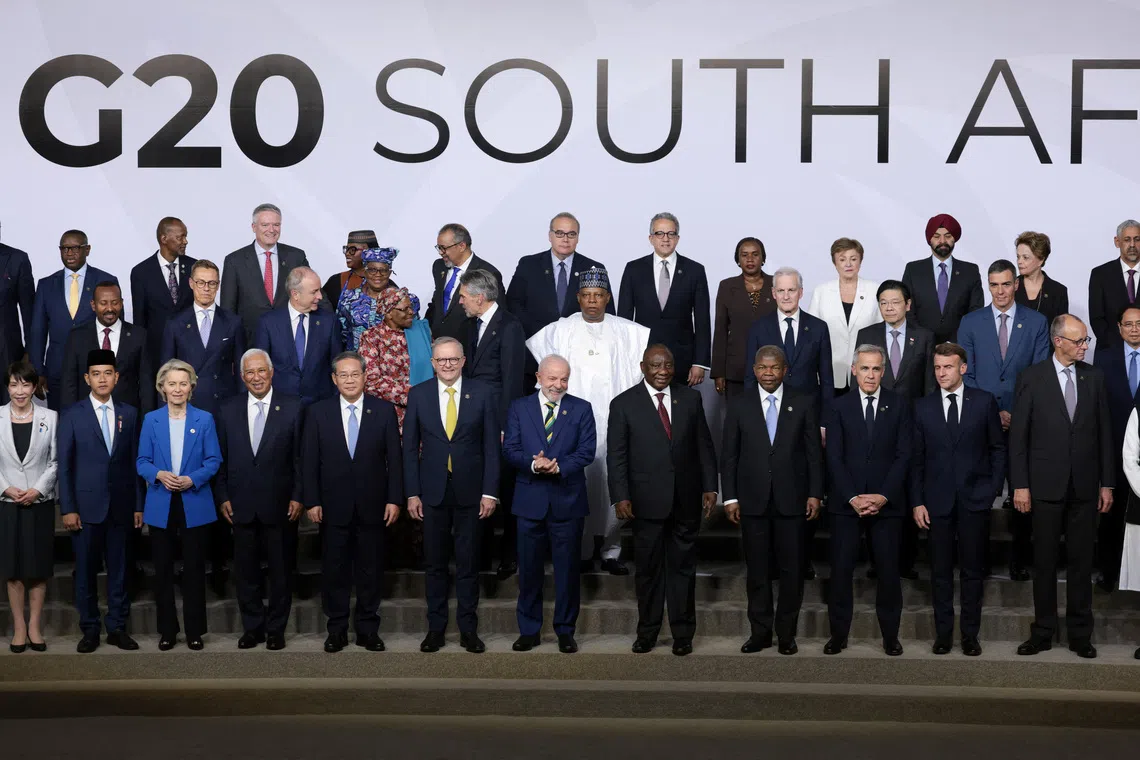South Africa-led G20 Defies US, Secures Landmark Declaration: A Victory for Multilateralism Amid Tensions
 South Africa
International Politics
South Africa
International Politics

Under South Africa's G20 presidency, member nations issued a rare declaration despite US objections, reaffirming multilateralism. The summit tackled climate, de
G20 Achieves Landmark Declaration Despite US Opposition
The Group of 20 (G20) major economies recently achieved a remarkable diplomatic victory, producing a joint declaration despite significant opposition, most notably from the United States. This outcome, largely credited to South Africa's assertive presidency, has revitalized the spirit of multilateralism amidst escalating global tensions and doubts about the G20's efficacy.
A Declaration Against the Odds
Serving as the G20 president this year, South Africa successfully rallied 18 out of 20 member nations, excluding only the US and Argentina, to endorse a comprehensive declaration. This achievement came despite stern warnings from Washington and widespread skepticism about Pretoria's ability to secure consensus on critical global issues. Many observers had doubted the summit would yield any meaningful agreement, let alone address complex challenges such as climate change, external debt relief for poorer nations, and global inequality. The successful declaration not only strengthened the G20 as a forum for international cooperation but also underscored the enduring power of multilateral efforts in an era often characterized by their retreat.
US Displeasure and Allegations
The declaration, however, drew strong criticism from the United States, which is set to host the G20 next year. The White House accused South Africa of misusing its presidential role to undermine the G20's foundational principle of unanimous consensus. Former President Donald Trump, who boycotted the summit over unfounded claims regarding South Africa's treatment of its white minority, reportedly vowed to restore the G20's "legitimacy" during his country's upcoming tenure. Washington remained silent on whether it would disinvite South Africa from future G20 events. Intriguingly, the declaration's final paragraph carefully committed to future G20 summits in Britain and South Korea but only pledged "working together" under the US presidency. Furthermore, President Cyril Ramaphosa notably declined an American offer to have a junior diplomat receive the rotating G20 presidency, opting instead for a ceremony between equivalent diplomats.
Tackling Pressing Global Issues
The G20 declaration made significant strides in areas often marked by deep divisions among members, including climate change and renewable energy. Crucially, it proposed the establishment of the first-ever global panel dedicated to tackling the pervasive issue of inequality. Nabil Ahmed, Senior Director of Economic Injustice at Oxfam, lauded this as a groundbreaking moment, placing the "inequality emergency at the centre of the international agenda" for the first time by world leaders.
A New Approach to Dealing with Trump?
The defiance shown by G20 leaders in the face of US objections suggests a potential shift in international diplomatic strategy. Michael Bociurkiw of the Atlantic Council’s Eurasian Centre noted that leaders chose to "stand up" to Trump rather than "butter him up," reflecting a growing exasperation among member states. This united front was interpreted by some delegates as a show of support for the host nation and a collective rebuke of the US boycott. It also reportedly fostered collaboration between countries often at odds with Trump, like India and South Africa, and those seeking to maintain strong relations, such as Britain and France.
Future Challenges Under US Leadership
While the Johannesburg summit marked a triumph for multilateralism, concerns linger about the G20's future under the upcoming US presidency. There's a risk that much of the progress made could be diluted or undone. Washington is expected to narrow the G20's focus during its tenure, coinciding with the United States' 250th anniversary, primarily to the leaders' summit and financial forum. This could lead to the abandonment of other vital working groups and ministerial meetings concerning energy, health, and the environment. While the International Monetary Fund and World Bank are still expected to be included, sources indicate that UN organizations may be excluded. However, some delegates remain optimistic, suggesting that other nations could "lay low" during the US presidency and resume collaborative work afterward, especially since Washington's agenda still aligns with South Africa's in key areas like development, economic growth, and financial stability.
The Johannesburg G20 summit, therefore, stands as a testament to determined diplomacy, showcasing how nations can overcome significant obstacles to advance a collective agenda, even when facing resistance from powerful members.